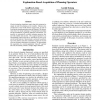Free Online Productivity Tools
i2Speak
i2Symbol
i2OCR
iTex2Img
iWeb2Print
iWeb2Shot
i2Type
iPdf2Split
iPdf2Merge
i2Bopomofo
i2Arabic
i2Style
i2Image
i2PDF
iLatex2Rtf
Sci2ools
103
click to vote
AIPS
2006
2006
Explanation-Based Acquisition of Planning Operators
Classical planning algorithms require that their operators be simple in order for planning to be tractable. However, the complexities of real world domains suggest that, in order to be accurate, planning operators must be complex. We demonstrate how, by taking advantage of background knowledge and the distribution of planning problems encountered, it is possible to automatically construct planning operators that are both reliable and succinct. The acquired operator is an encapsulated control loop that is specialized to best fit observed world behavior. Succinctness is achieved by publishing to the planner only those conditions required to succeed over the estimated distribution of problems. We demonstrate the acquisition of a context-appropriate "take-off" operator that can successfully control a complex flight simulator.
AIPS 2006 | Artificial Intelligence | Classical Planning Algorithms | Operator | Planning Operators |
Related Content
| Added | 30 Oct 2010 |
| Updated | 30 Oct 2010 |
| Type | Conference |
| Year | 2006 |
| Where | AIPS |
| Authors | Geoffrey Levine, Gerald DeJong |
Comments (0)

